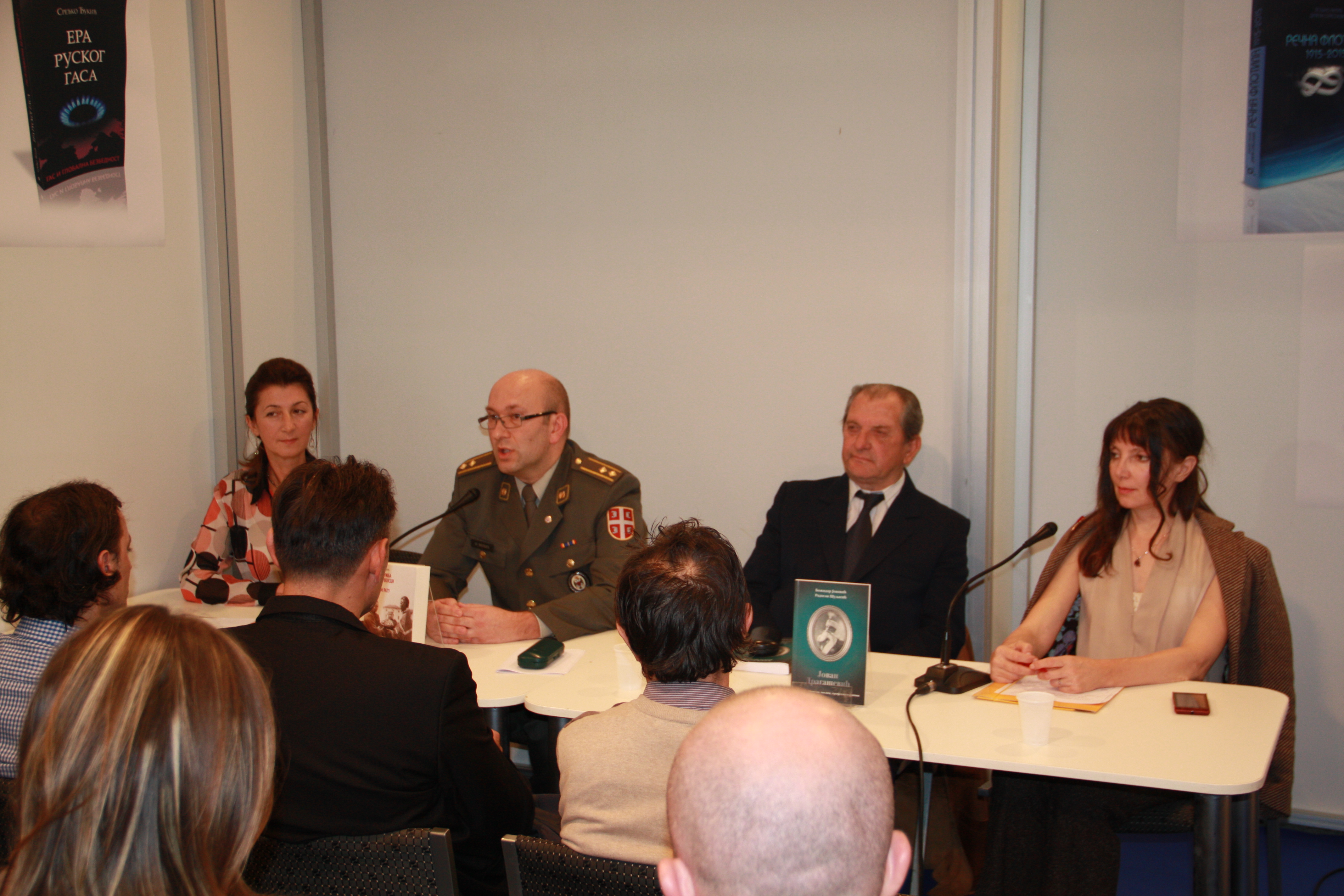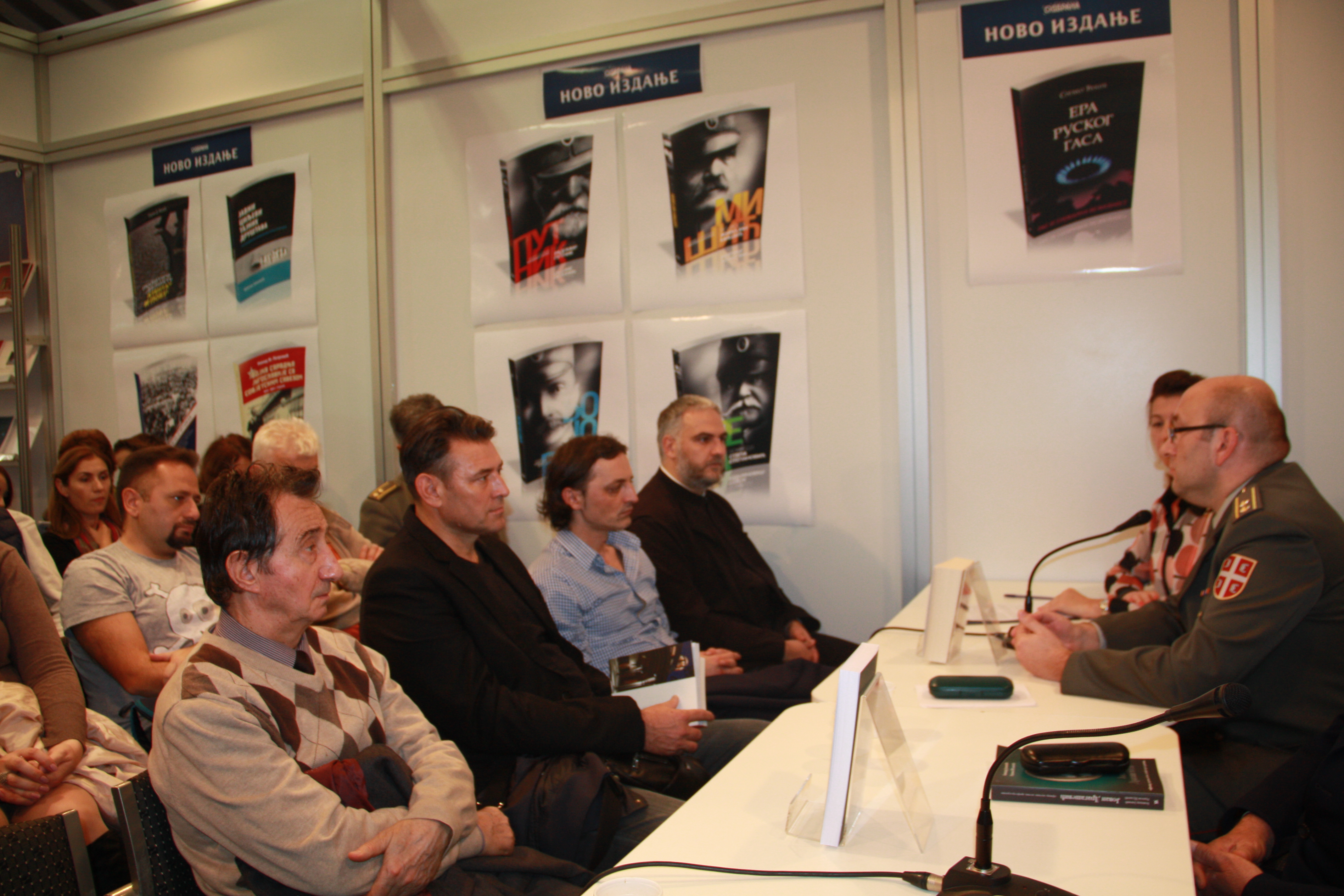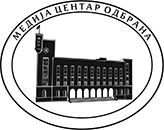28.10.2016
Friday at the Book Fair
 As in previous days, at this year's Book Fair, Odbrana Media Centre made sure that they had arranged a real challenge for literary connoisseurs, with a special affinity for historiography and some different personalities and topics. Thus, today they promoted two interesting books: ‘The religious service in the Serbian Army in the First World War’, by Lieutenant Colonel Miljan Milkic and ‘Jovan Dragasevic – officer, scientist, poet, professor and warrior’ by Bozidar Jovovic and Radosav Suljagic.
As in previous days, at this year's Book Fair, Odbrana Media Centre made sure that they had arranged a real challenge for literary connoisseurs, with a special affinity for historiography and some different personalities and topics. Thus, today they promoted two interesting books: ‘The religious service in the Serbian Army in the First World War’, by Lieutenant Colonel Miljan Milkic and ‘Jovan Dragasevic – officer, scientist, poet, professor and warrior’ by Bozidar Jovovic and Radosav Suljagic.Mirjana Sandic, editor of the book on the religious service in the Serbian Army during World War I, said that the war conflict itself as well as the participation of the Serbian Army in it cannot be considered without considering the role of religious services and priests of all denominations in the militaries of the warring parties. "The need for organizing religious services resulted from the significance of tradition for military organization, and the prerequisite for the creation of a stable army was exactly cultivating traditions of all religious communities and their members", Ms Sandic explained. "During the World War I, the role of the chaplains was even greater than required, since a great deal of time soldiers spent outside the borders of Serbia. During their stay in Corfu and Salonica Front, religious service had a especially positive effect on the morale of soldiers. For these purposes, religious literature was printed such as "Prayer of the Serbian warriors", which was read by priests for the victory of the Serbian and Allied arms."
 The author, Lieutenant Colonel Miljan Milkic, PhD, in his work, as the editor of the book said, great by the number of the investigated and published information, described the activities of 249 Orthodox priests, imams, rabbis. The author, as he himself explained, dealt with the role of the Roman Catholic clergy. "The information that I have, refer mainly to the prisoners from the ranks of the Austrian armed forces, both soldiers with their needs, and the priests who were also captured", Milkic says. "I would like to point out the testimony by Dr. Anton Jehart and fra Gavro Cvetanovic, who wrote that the prisoners had nowhere so many rights as those who found themselves in Serbian captivity, and that even though there was no organized religious service yet, there was no obstacle for practicing it. Particularly interesting is the case of 97 volunteers from Australia who joined the Serbian Army on the Salonica front – mostly Catholics, and they had service according to their custom. On that front, the Serbian Army had help of French priests for Catholics in its ranks. I think we can be proud of how the Kingdom of Serbia had this matter resolved. This proved to be particularly important when in November 1914 mobilization was conducted in the newly conquered areas whose population was predominantly of Muslim faith and who, according to the documents, found themselves in great fear. The number of deserters in their ranks was sharply reduced when they found out that in the Serbian Army they have the right to practice the religious service according to their customs."
The author, Lieutenant Colonel Miljan Milkic, PhD, in his work, as the editor of the book said, great by the number of the investigated and published information, described the activities of 249 Orthodox priests, imams, rabbis. The author, as he himself explained, dealt with the role of the Roman Catholic clergy. "The information that I have, refer mainly to the prisoners from the ranks of the Austrian armed forces, both soldiers with their needs, and the priests who were also captured", Milkic says. "I would like to point out the testimony by Dr. Anton Jehart and fra Gavro Cvetanovic, who wrote that the prisoners had nowhere so many rights as those who found themselves in Serbian captivity, and that even though there was no organized religious service yet, there was no obstacle for practicing it. Particularly interesting is the case of 97 volunteers from Australia who joined the Serbian Army on the Salonica front – mostly Catholics, and they had service according to their custom. On that front, the Serbian Army had help of French priests for Catholics in its ranks. I think we can be proud of how the Kingdom of Serbia had this matter resolved. This proved to be particularly important when in November 1914 mobilization was conducted in the newly conquered areas whose population was predominantly of Muslim faith and who, according to the documents, found themselves in great fear. The number of deserters in their ranks was sharply reduced when they found out that in the Serbian Army they have the right to practice the religious service according to their customs." Promotion was continued by presentation of the book about the almost forgotten General Jovan Dragasevic, initiator of military publishing, a geographer, historian, poet, author of the slogan "Only unity saves the Serbs". "He believed that only a strong army, led by well informed and highly educated personalities can accomplish great work of national liberation and state-building", Snezana Djokic, MA, editor of the book, said. "His life, despite the excellent education and great work, was marked by pain, great struggle, and his achievements were often repressed."
Promotion was continued by presentation of the book about the almost forgotten General Jovan Dragasevic, initiator of military publishing, a geographer, historian, poet, author of the slogan "Only unity saves the Serbs". "He believed that only a strong army, led by well informed and highly educated personalities can accomplish great work of national liberation and state-building", Snezana Djokic, MA, editor of the book, said. "His life, despite the excellent education and great work, was marked by pain, great struggle, and his achievements were often repressed."Radosav Suljagic, one of the authors of the book, explained that it is about correcting injustice towards a personality that for his values and everything he did, could not be forgotten: "Everything is the result of our years of research of the fundaments of the Serbian war theory. He was a writer, poet, creator of several war theories who was prevented only by the environment to express himself as our Clausewitz. A founder of military geography and cartography, he launched the first military newspaper in the Balkans. Before him, French newspapers were studied here. "It is, of course, the famous magazine "Warrior". This superb storyteller who, as Suljagic says, could easily take the title of a founder of Baedeker guides in our country because of his very live narration. He was the man who founded the Serbian Chetnik (guerrilla) warfare, which was the highest form of guerrilla warfare in the period from 1876 to 1918. "He was one of the brightest and most educated people of that time in Serbia, who created scientific works, and he was a doctoral candidate in several scientific disciplines, in the literary language", Suljagic said.
 PHOTOGALLERY
PHOTOGALLERY
